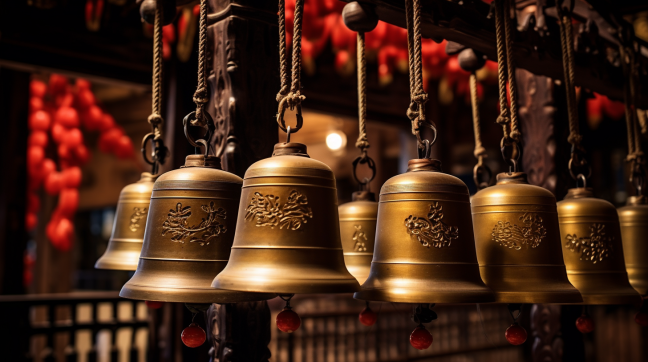Joya no Kane is a traditional Japanese Buddhist custom observed during New Year’s Eve. Translated as “The Bells of Joy,” this ritual involves the ringing of temple bells 108 times as the old year transitions into the new. The reverberating bell sounds are symbolic, serving both spiritual and cultural purposes in Japanese society.
Spiritual Significance
In Buddhist teachings, human beings are said to be afflicted by 108 worldly desires or passions, known as “bonnō” (煩悩) in Japanese. These desires are believed to be the sources of human suffering and entanglement in the cycle of rebirth. The act of ringing the temple bells 108 times is a ceremonial way to purify one’s mind, symbolically eliminating each of these desires to start the new year with a fresh, unburdened spirit. As the bell tolls, it is an invitation for reflection and an opportunity for individuals to confront and let go of the past year’s regrets and negative emotions.
Cultural Impact and Observance
Joya no Kane is a deeply rooted tradition in Japan and is observed in many temples across the country. As midnight approaches on New Year’s Eve, temples begin the bell-ringing ceremony, and by the 108th ring, it’s officially the new year. While the ceremony has religious origins, many Japanese people, regardless of their personal beliefs, feel a profound connection to this practice, seeing it as a quintessential aspect of the New Year’s observance.
In some areas, temples open their doors to the public, allowing participants to have a hands-on experience in ringing the bell. This communal participation fosters a sense of unity and collective purification.
In her book “Japanese Celebrations: Cherry Blossoms, Lanterns and Stars!,” Betty Reynolds captures the essence of Joya no Kane, stating, “The deep resonance of the temple bells awakens not just a new year but a renewed opportunity for individuals to lead a life of clarity and purpose.”
Joya no Kane is a testament to Japan’s rich tapestry of traditions that beautifully blend the spiritual with the cultural. More than just a ritual, it serves as a moment of introspection, a bridge between the old and the new, and a communal experience of hope and renewal. Whether one is a devout Buddhist or simply a participant in the cultural festivities, the bell’s echoing sounds during the silent winter night offer a moment of reflection and a fresh beginning.
